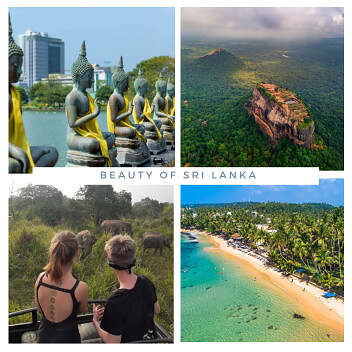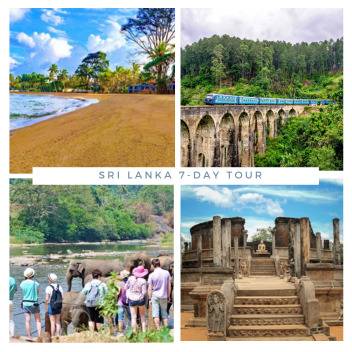The succession to the throne of Kotte
Sri Lanka had been under the colonial rulers for more than 450 years. The Island was first invaded by Portuguese in 1505. Later they managed to build a Fort in southern Sri Lankan city of Galle and later expanded their grip on the island without the consent of the king. This blog post is about some important incident that taken place duei8ng the Portugues Colonial Era.
King Vijaya Bahu
Vijaya Bahu(1519-1521) was unwilling to be openly hostile to the Portuguese and therefore asked one of the principal opponents of the Portuguese in India to attack the fort. This was the raja of Calicut known as the Samorin, Lord of the Sea. The Samorin sent a Malabar force which, with the assistance of the Sinhalese, laid siege to the fort. Silveyra was short of provisions, which the townspeople of Colombo would not supply, and his garrison, moreover, was insufficient to give battle to the besiegers. He, therefore, tried a surprise sally.
One night with a small band of picked men he fell unexpectedly upon the besieging camp. Taken unawares at dead of night, the besiegers fled in confusion, leaving the stockade in the hands of the Portuguese, who forthwith demolished the fortification.
Upon this Vijaya Bahu thought it best to pretend friendship and sent an envoy to Sylveya to offer congratulation on the success and excuses for not coming to his aid when he was attacked by the Malabars. As Sylveyra had no order to break with the king, he expressed himself satisfied.
The fortress re-built
In 1520 the new governor of India, Diego Lopes de Siqueyra sent Lopo de Brito as captain of Colombo (1520-1522) with a number of workmen to build a stronger fort. While this was being done, the townspeople refused to supply provisions to the fort, and Brito attacked the town and burnt the Muslim quarters.
While the soldiers were busy sacking and plundering, they were suddenly attacked and driven back. The fort was scarcely finished when it was again besieged: Vijaya Bahu himself now openly declared against the fort. Brito sent appeals to Cochin for help, but two of the messengers fell into the hands of the king and betrayed how hard-pressed the garrison was for provisions.
Another messenger, however, managed to reach Cochin and on the return of the Portuguese fleet from the Red Sea 50 men and provisions were dispatched to Colombo. With them, Brito attacked the besieger by land and sea and drove them from their entrenchments. They returned in larger numbers with twenty elephants of war and a force of Malabar cavalry but were again repulsed, and the victorious garrison again burnt the township of Colombo.
These repeated failures to oust the foreigner told against Vijaya Bahu. When he was raised to the throne, he married a princess of Kiravella who brought with her a little boy whom Vijaya Bahu adopted.
Arrival of Franciscans
Towards the end of 1543, the ambassador returned to Ceylon with Friar John de Vila de Conda and four other Franciscans friaers bearing letters from the king of Portugal and the viceroy of India. Buwaneka Bahu was quite pleased with the result of the embassy and gave friars a warm welcome. They had come with the idea that Buwaneka Bahu and his subjects wished to be instructed in Christianity.
Great, therefore, was their disappointment when they found that such was far from being the case. Buwaneka Bahu indeed showed no disinclination to maintain the friars and to let them preach, but he had no intention of letting his subjects become Christians, much less of becoming one himself. Such a course would certainly have made his subjects go over to Mayadunne. On the other hand, Buwaneka Bahu was unwilling to give offence to the friars or to the king of Portugal and tried to appease the former by the offer of money, which they indignantly rejected.
Quarrels over the succession
The solemn appointment of Dharmapala as the crown prince of Kotte gave rise to great dissatisfaction. Mayadunne, who had hoped that the throne would be his on the death of his brother, according to the Sinhalese laws of succession, was greatly incensed and took up arms. The two sons of Buwaneka Bahu by the junior queen had also aspired to the throne. Buwaneka Bahu, therefore, dispatched the Pandita to Goa to seek immediate assistance against Mayadunne and if necessary, to go again to Lisbon to press the matter.
To pacify his sons, he now asked Portuguese assistance to place them on the thrones of Jaffna and Kandy. But the elder son, jugo Bandara, a young man of about seventeen years of age, began to intersect the Portuguese on his behalf.
A certain andre de Souze, who was at the court of Kotte, had been trying to make him a convert to Christianity. It now seemed to Jugo and his mother, that he went to Goa and received baptism; he might be supported by the Portuguese. This plan reached the ears of Buwaneka Bahu who caused to be secretly murdered. Thereupon, his brother who was also under instructions fled the country with Souze. They were followed by a son of Buwaneka Bahu.
Embassy of Kotte
Meanwhile, on the death of Martin Afonso de Souze, there succeeded as viceroy of India, Don Joao de Castro, a man of great ability and wisdom. He did not think it right to support the Christian princess who was in Goa, without first ascertaining the intention of Buwaneka Bahu. Accordingly, he dispatched an ambassador to Kotte to discuss the matter with Buwaneka Bahu, instructing the envoy not to break with the king unless he refused to allow the friars to preach Christianity in his realm.
Buwaneka Bahu declared very firmly that he did not intend to become a Christian and denied that the Pandita was ever authorized to promise it. He maintained that it was not from hostility to Christianity that he seized the lands of converts but for other reasons, and professed himself ready to give the friars liberty to preach and build churches.
The ambassador, however, soon discovered that the king’s attitude towards the Portuguese had changed. He received also secret communications from Vikrama Bahu who represented to the Portuguese how earnestly he had sought the alliance of the Portuguese without success, how Buwanekabahu and Mayadunne were leagued against him, and that he wished to become a Christian and give his daughter, who was being solicited as the bride of Buwaneka Bahu’s heir, to one of the Christian princess in Goa. As the ambassador fell ill at Kotte, a friar set out Goa with the letters of Vikrama Bahu.
Portuguese intervention of Sri Lanka affairs
Buwaneka Bahu the king of Kotte was dissatisfied with the Portuguese. Buwaneka Bahu’s main grievance was the lawless behaviours of thaws e Portuguese living in his kingdom, for it increased his unpopularity with the people. To add to this the king of Portugal the friars, and the viceroy was urging him to become a Christianity, a thing which he had no mind to do; and on that account, they now appeared to be disposed to go back on their solemn promise to uphold him and his heir on the throne, as the promise was made on the supposition that they intended to be Christians, Buwaneka Bahu was therefore quite prepared to join hands with Mayadunne against the Portuguese.
Mayadunne who was more powerful, more popular, and more ambitious, seeing that he was bereft of Malabar aid and that it was only his brother’s alliance with the Portuguese that prevented him from seizing the throne of Kotte, determined to embroil Buwaneka Bahu with the Portuguese, and to this end he feigned friendship. He now aspired to be the sole king of Ceylon and therefore wished to add the kingdom of Kandy to his domain. Accordingly, he and Buwanekabahu prepared to make war on Vikarama Bahu.
Wikrama Bahu had been watching with alarm the growing ambition of Mayadunne. It was he who had helped Buwaneka Bahu and Mayadunne to sack Kotte and divide the empire between them. The dismemberment of the empire had made his kingdom the largest in size: for though originally only a small principality consisting of the five ratas, he had now profited by the turmoil in the lowlands to add the Vanni district and to bring the Vanniyars of Batticaloa, Trincomalee, Vellassa, Yala, and Panava, as well as the prince of the seven Koralesunder his sway.
But hearing of the ambitious plans of Mayadunne, he secretly summoned a Portuguese to Senkadagala to sound the disposition of the Portuguese, and on his advice, he asked the viceroy of India to build a factory at Trincomalee for trade with his kingdom and offered to pay tribute to Portugal.
The reply of the Portuguese, however, fell into the hands of Buwaneka Bahu and nothing came of the proposal. Buwaneka Bahu and Mayadunne now seized the passes to Kandy and prepared for war, whereupon Vikarama bahu with the prince of the Seven Korales and the Vanniyars of Trincomalee and Batticaloa appealed to the Portuguese for aid, saying that they wished to become Christians.
Portuguese intervention in Jaffna
In response to this appeal, Castro determined to send troops and friars to Kandy. He abandoned the idea of enthroning a prince in Kotte but decided to enthrone one in Jaffna.
Jaffna
The throne of Jaffna was occupied by Chekarasa Sekaran or Sankili who had murdered the lawful king in 1519 and had ascended the throne from which he had expelled the legal heir. He had put to death the supporters of the lawful king. The lawful heir had fled to India to seek for Portuguese aid. The king of Jaffna claimed the right to all ships stranded off that shallow coast, and Sankili had many a shipwrecked off his coast. Accordingly, Martin Afonso de Souze in 1543 came with a large fleet and the exiled heir and forced the raja to become a tributary to Portugal and pay vassalage.
The massacre of the Christians
Notwithstanding the treaty, in 1544 Sankili put to death some six or seven hundred people of Mannar who had become Christians. They had invited St. Francis Xavier to Mannar, but as he was too busily engaged elsewhere, he sent another priest who instructed and baptized a large number of the people of Mannar. Thereupon the king of Jaffna sent troops to put them to the sword unless they abandoned the new faith. Some escaped to the mainland and the rest were killed.
The Portuguese, at the earnest request of St. Francis Xavier, half-heartedly got up an expedition to punish the king for the massacre, but it only served to recover the cargo of a richly laden Portuguese ship which had run aground off Jaffna.
The people of Jaffna turn to the Portuguese
Soon, however, the people of Jaffna sent an embassy to Goa to beg the viceroy to place one of the Sinhalese princesses on the throne, as the kingdom formerly belonged to Kotte, the governor was anxious to do this as he feared to be taken to task for not inflicting condign punishment on the king for the massacre of the Christians.
Death of the convert princes
But meanwhile, smallpox broke out in Goa and carried off the two Sinhalese princes in January 1546. Thereupon the plans were changed. An expedition was got ready to enthrone the lawful heir of Jaffna and Andre de Souza was sent to aid the king of Kandy.
In February 1546 Souze set out with a friar and 50 men for Kandy. At Kayalapatanam he met the heir of Jaffna and heard that the king of Kandy had made peace with Mayadunne and Buwaneka Bahu by paying a heavy peace offering. But as the news was not quite certain he came to Colombo where Buwaneka Bahu tried to dissuade him from going to Kandy. Souze then tried to make his way to Kandy by rounding the island but was forced to land at Yala. Sending a part of his men to Trincomalee where a messenger of the king of Kandy was awaiting them, Souze made his way to Kandy.
After a dreary march of many days, he arrived with 38 men to find the news he had heard was quite true. As the successor delayed, a Portuguese who was at Senkadagala advised the king to become a Christian at once, saying that if he did so, the Portuguese would speedily come to his assistance. Thereupon a friar was summoned from Kotte and the king was baptized in secret, and news of it sent to Goa. But as the reinforcement still delayed, the king was forced to pay Mayadunne the ransom demanded, namely 2,400,000 fanams, nine gems, two elephants, his own state elephant and other jewels, and promise his daughter as the bride to Dharmapala.
The disappointment of Vikrama Bahu
Vikarama Bahu was disappointed when he saw the paltry force and the covetousness of the commander and said that he would not let his household become Christian unless the governor of India or his son arrived with larger forces.
The friar, therefore, set out for Goa with letters from the king, the prince and Souze. Souze stated that the king was quite sincere; the friar, on the other hand, maintained that his Christianity was all a sham. But war broke out in India, and the governor was not in a position to act Vikarama Bahu, however, was importunate in demanding help and sent further messages. The bishop of Cochin and the friars also interceded for the king, whereupon Castro decided to send reinforcements.
The expedition to Jaffna abandoned
The proposed expedition to Jaffna was postponed. In fact, the king of Portugal was in great perplexity over it; St.Francis Xavier urged him to punish Sankili and place the lawful heir on the throne: the Christian princess had asked for it: Buwaneka Bahu, on the other hand, claimed it for himself and promised to forego the debt due to him and to pay a larger tribute. The king of Portugal, therefore, referred the matter to a council which declared that the reigning king should not be deposed unless, after due admonition, he refused to let the gospel be preached in his realm.
Portuguese opinion on the succession
About the succession to Kotte, the council advised the king to make further inquiries about the customary laws of succession. If the grandson was the rightful heir according to the custom of the country, he should be upheld; if the nephew was found to be the rightful heir, the letters patent granted to Dharmapala should be considered surreptitious.





